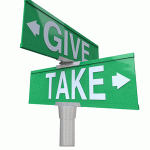 I have revisited this question in my personal life over the last three decades—as I’m evaluating others and as I’m taking a close look at myself—to determine in which group I belong. I remember marveling at how much I seemed to soften after my son was born, but even that was nothing compared to the change I’ve seen in myself as I have transitioned to being the primary caregiver for my parents. In both instances, I think of myself as a giver.
I have revisited this question in my personal life over the last three decades—as I’m evaluating others and as I’m taking a close look at myself—to determine in which group I belong. I remember marveling at how much I seemed to soften after my son was born, but even that was nothing compared to the change I’ve seen in myself as I have transitioned to being the primary caregiver for my parents. In both instances, I think of myself as a giver.
But I’ve realized over the years that so much of what we do to manage our lives and our modern-day habits has unintentionally turned many of us into takers. Our need for independence and privacy, mixed with our desire to keep our online “lives” secure, means that many of us are unwilling to share information that would allow someone else to step in and help us if we needed it, even temporarily. By making it so difficult for those around us to help—and by refusing to acknowledge that we may need their help—we become takers.
Let me use three recent examples from new clients to illustrate my point:
- A single woman in her 30s and a small business owner has a car accident. Her partner can’t access her email or voicemail because she did not share usernames and passcodes, making it difficult to run the business in her absence. Her friends have to beg the apartment owner for a key to her home so they can get in to feed her cat while she’s in the hospital.
- A married man in his 60s has a stroke. His wife has never managed their checking account, nor has she ever paid a bill. Their daughter lives nearby and can help mom navigate the online banking and payment services while her dad recuperates.
- A married woman in her 40s and the mother of two has a heart attack. She did not share the username or passcode to the family’s online bill paying sites, so her husband has to patiently wait for the final bill notices to be mailed in order to pay many of their accounts. Thankfully, her friend knew the name of the family’s pediatrician, so the husband wasn’t worried about caring for the kids’ needs as their mother recovered.
Could any of these scenarios happen to you? When you are the one who steps in to assist someone else in need, you realize very quickly that the lack of documentation and planning has created a very large burden for you. But it seems many of us are doomed to repeat the same mistakes.
It doesn’t have to be that way. We should all document and share the location of our username and passcodes to our online bill pay accounts, as well as our primary email accounts. View this as a simple life maintenance task – just as you would get your teeth cleaned or get an annual physical.
Not sure where to start? I’ve made the process easy for my clients through my MemoryBanc Register, which will lead you step-by-step through the entire documentation process. I also recommend speaking with an estate lawyer to get a durable power of attorney for your small business if you own one, and for your family and friends, so that they can step in and help should you need it.
We are more likely to have a temporary disability than we are to die up through our late 80s. To find out your Personal Disability Quotient, visit this site: www.whatsmypdq.org



